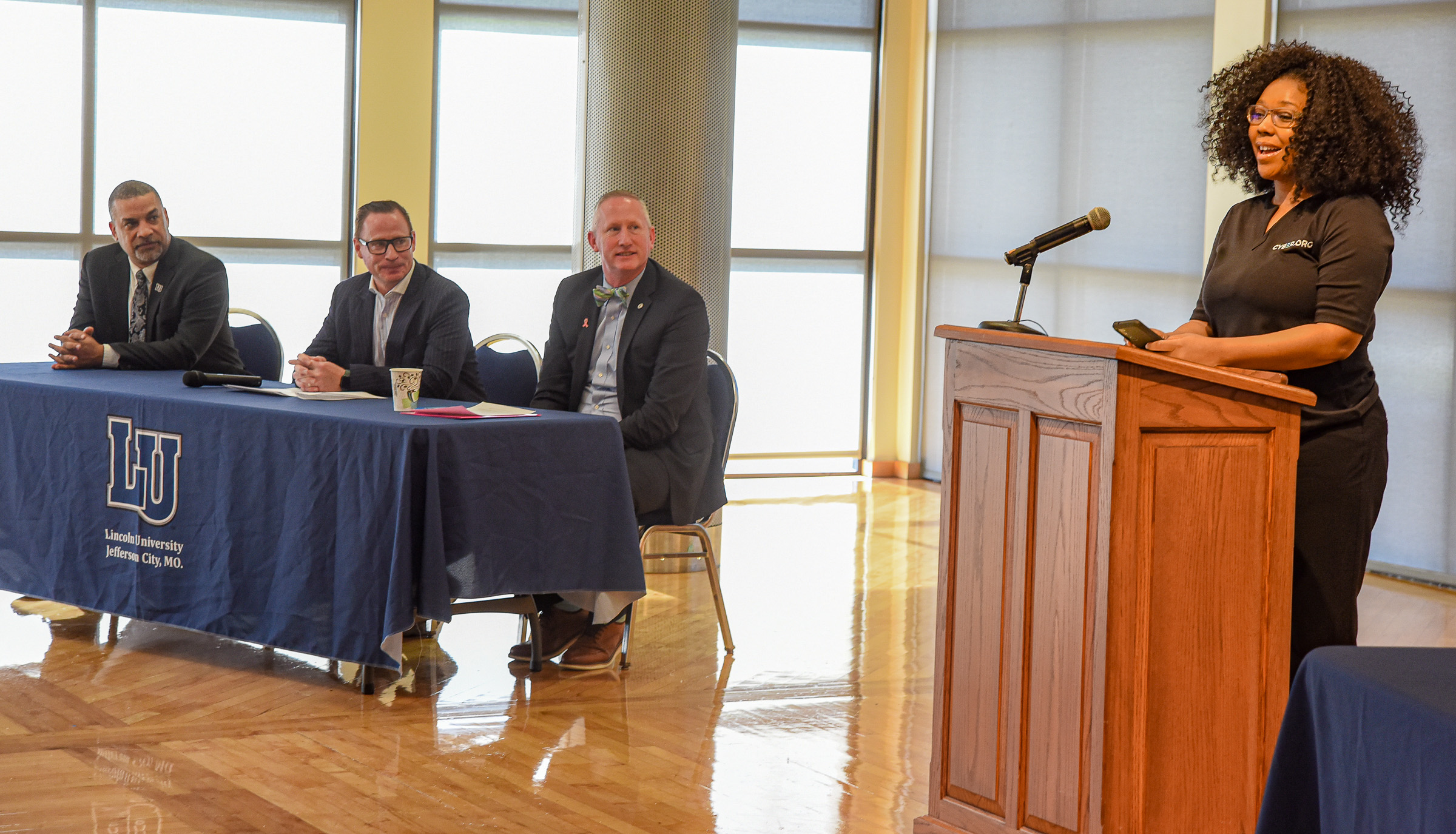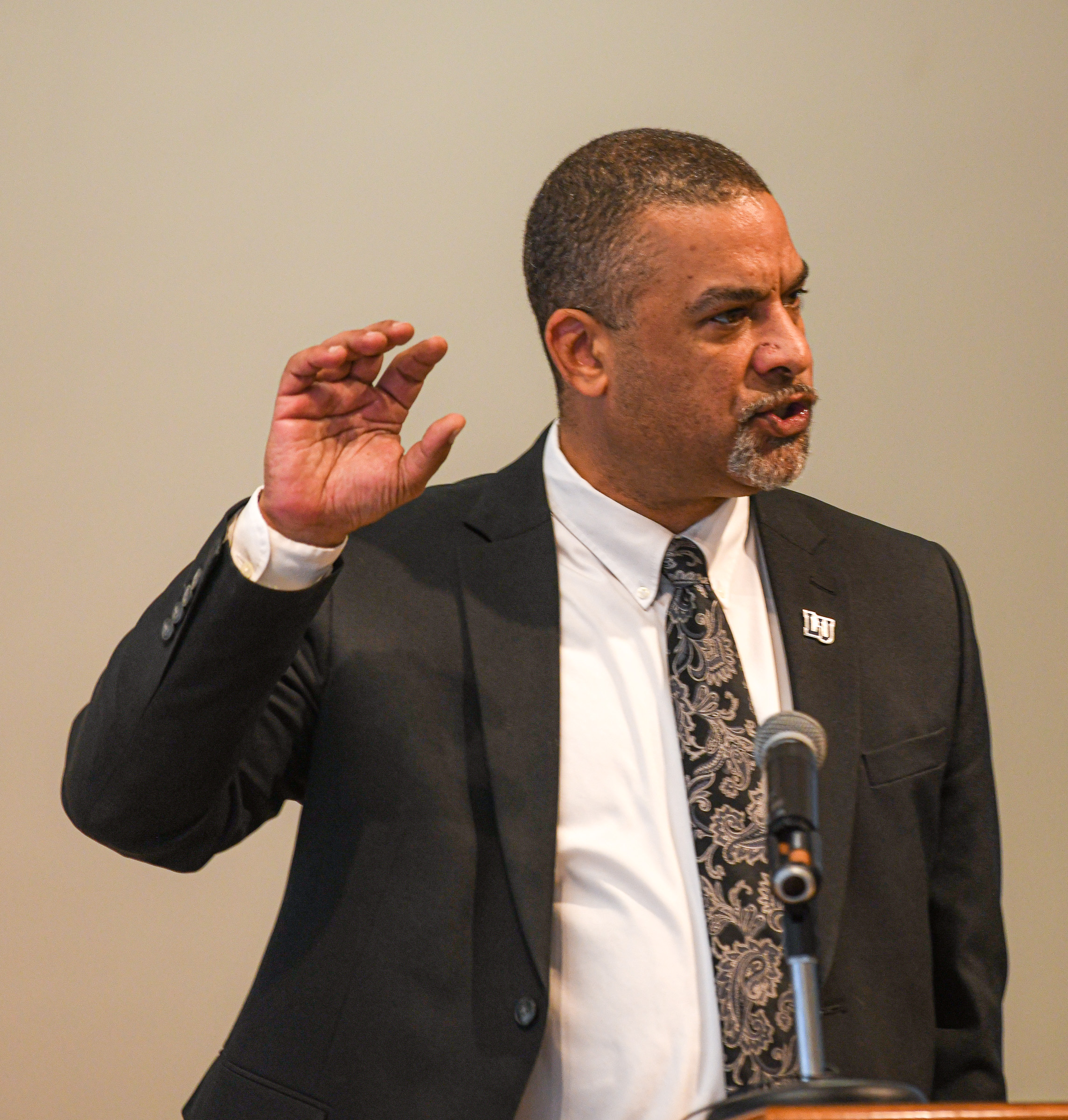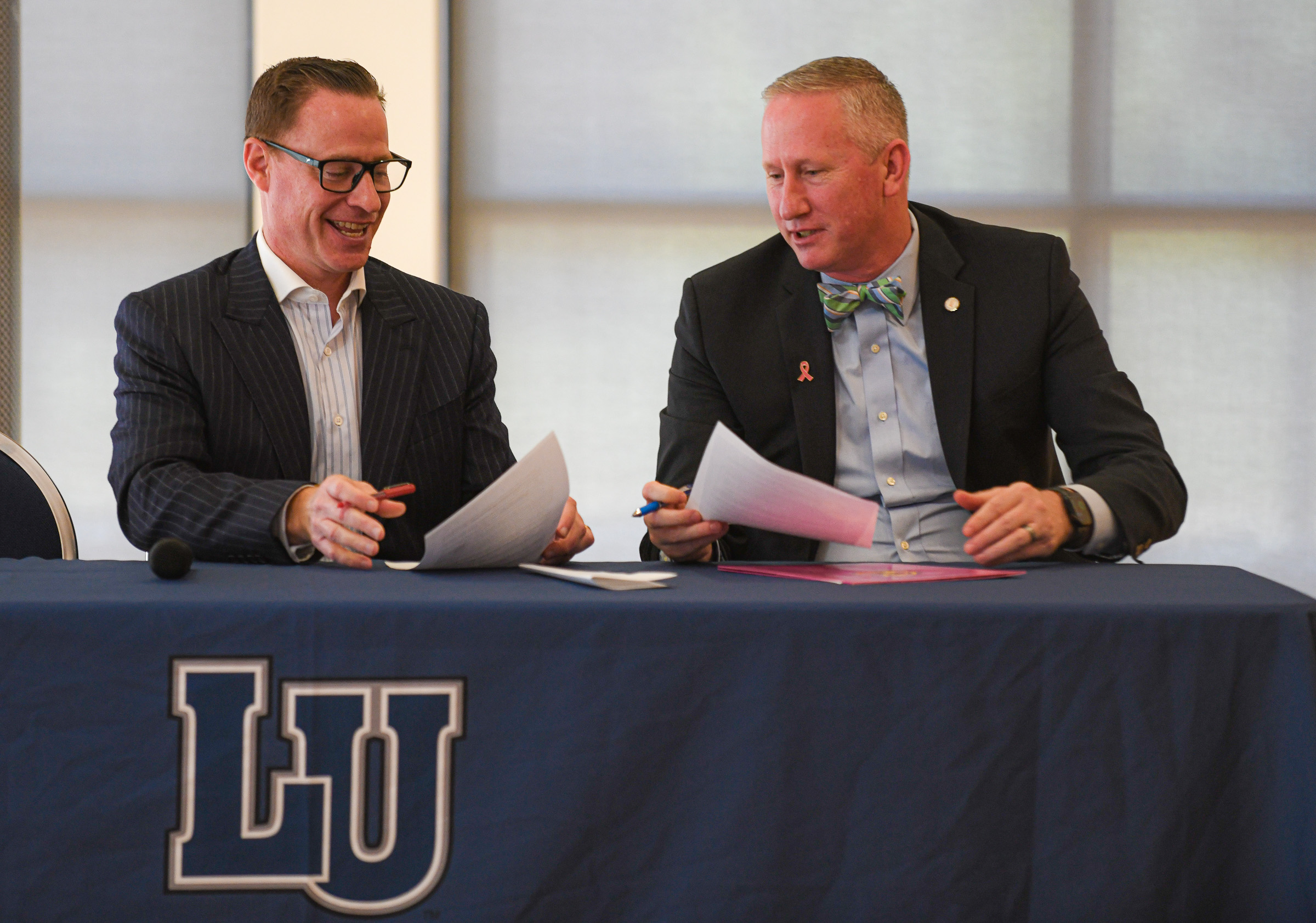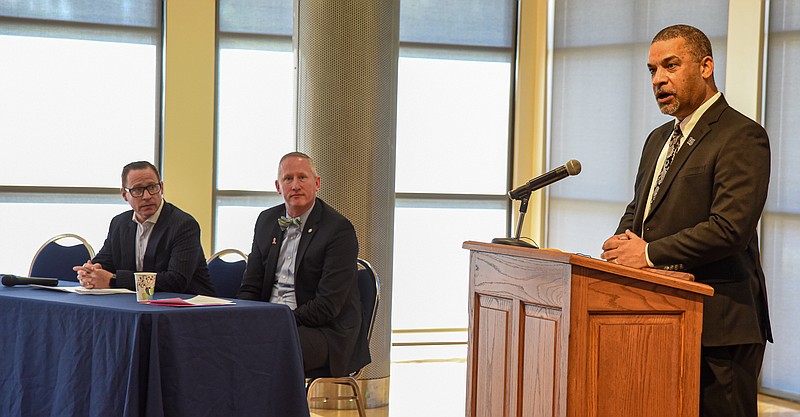Lincoln University and the Jefferson City School District are partnering on a new academic initiative designed to bolster the nation's cybersecurity workforce.
University President John Moseley and Superintendent Bryan McGraw signed a letter of articulation after announcing the Project Reach partnership Thursday morning. The agreement solidifies a new educational opportunity for area students and marks a step forward for the historically Black college's relationship with its largest feeder school.
The partnership centers around Cyber.org, an academic initiative from the Cyber Innovation Center that is supported through grants from the federal Cybersecurity & Infrastructure Security Agency. Cyber.org has partnered with 10 historically Black colleges and universities to develop and distribute cyber, STEM and computer science curricula to K-12 schools across the country.
"We immediately thought of our friends here locally," Moseley said. "And the hope is that it creates a seamless transition and potential pathway for high school students to move into the cybersecurity space for their college and then for their career."
The program has started out as morning clubs at Jefferson City High School and Capital City High School. Both high schools have direct access to Cyber.org curriculum and professional development and plan to offer full classes next year. It could eventually lead to high school students graduating with professional cybersecurity certificates.
Lincoln's role is to develop the certificate opportunities and provide administrative support, which will be handled through its computer sciences program and faculty. Lincoln faculty will regularly attend club meetings, assist with development of curriculum and help organize external speakers and experts to visit classes.
"How blessed we are as a community to have one of our state's two HBCUs right here in our very own backyard," McGraw said. "And how blessed we are as a school district to have the opportunity to partner with them on this project that has the potential to put our JC Schools students on a fast track to obtain highly sought after careers in cybersecurity."
McGraw said the school district's first priority is to ensure students are college and career ready. Offering the most advanced placement courses in the area helps do that, but Project Reach takes that college-level experience to a new level, he said.
Teachers are now equipped with a high quality curriculum to embed in computer courses, he said, and students interested in computer science or cybersecurity will have relevant coursework to further those interests.
Project Reach also establishes a clear pipeline to enroll in a program at Lincoln upon graduation or enter a field with numerous job opportunities working for the U.S. government, military or private industries, McGraw added.
"What I would have given to have this type of opportunity when I was in high school right in front of my fingertips," he said.
Ken Enloe is the director of human resources and business development at Huber & Associates, a local IT solutions and services company, and he sits on the Jefferson City School Board. He said the partnership is fantastic.
Enloe said he sees the need for additional people in the IT field every day and understands the challenge companies face when trying to recruit. Providing students with skills and experience early sets them apart to employers, he said.
"Nobody has less data today than they had yesterday and nobody has less vulnerabilities and security risks today than they had yesterday, so those are two things that are just constantly on the forefront of every one of our customers, public and private sector," Enloe said. "Everybody is trying to overcome those challenges so this program is just a fantastic opportunity for us locally."
Overseeing the program are Chris Herriman at Jefferson City High School and Jon Lindquist at Capital City High School.
Herriman said he has numerous ideas for where to take the program but wants to discuss them more with administration before they are implemented. Cyber.org curriculum can extend down to the kindergarten level but is only being implemented at high schools right now.
Lindquist said he had four students attend the first club meeting at Capital City, but they were eager to start planning for the next one.
"Those kids were just -- they were excited," he said. "There was a lot of energy. ... As an educator, that's what I like to see."
Herriman, a business teacher, said he's excited about the career prospects for students engaging with cybersecurity education. While he talks to students about some careers that are below average for job growth, Herriman said the jobs Cyber.org sets students up for are consistently higher than the national average.
"The partnership is a win-win, not only for Lincoln University but also for us because we can send our kids directly into the workforce," he said. "And the thing I love about cyber is they can do their own business if they wanted without a degree, without a certification. It's one of those fields that's growing that if you're good at what you do and you're passionate about what you do, performance will get you where you need to go."
Corisma Akins, a cyber education specialist with Cyber.org, said Project Reach is an HBCU feeder program created to diversify and bolster the country's cybersecurity workforce.
It connects K-12 schools to HBCUs that have cybersecurity, computer science or related programs to close diversity gaps in the field. Akins said there are more than 700 open positions in the national cybersecurity workforce and a steady uptick in cyber attacks, making it a growing career field.
Lincoln has an established computer science degree program and is in the process of reviewing courses to develop a cybersecurity certificate program and, eventually, a degree program.
The certificate will be a 15-credit, one semester program housed under the university's developing Security Sciences Institute. Lincoln's partnership with Cyber.org will provide an easy transition from high school coursework to Lincoln's certificate or degree programs.
Darius Watson, Lincoln's executive director of academic initiatives, spearheaded the Project Reach partnership and collaboration with Cyber.org.
He said the next step for the university is to expand the partnership to high schools in St. Louis and Kansas City. That could then lead to development of cybersecurity conferences or camps for the high school students to engage in.
"We're really excited about what this represents," he said. "We see this as the first of many steps towards not just greater partnership with Jefferson City but a full and more robust development of our own security sciences programs here at Lincoln University."
Watson said the Security Sciences Institute will integrate the Project Reach cybersecurity pathway for high school students, as well as the university's certificate and degree programs and professional advancement and development programs. Degree and certificate programs in development include criminal justice associated with mental health, GIS, cybersecurity, EMT and food security and safety. The university's criminal justice degree program, law enforcement training academy and ROTC will also be included in the institute.
With an emergency operations training center planned for the Security Sciences Institute as well, Watson said the university will be able to provide students and professionals looking to get re-certified or skill up live simulations.
A lot of initial development within the Security Sciences Institute will be focused on professional certificates, Watson said, which typically attract non-traditional students and working adults. Associates degrees that would be similar to the culmination of multiple certificates could be a few years down the road, he said.
"You might have some freshmen sitting next to a 45-year-old cybersecurity expert who just needs to re-certify, and that to us is what education is going to look like in the future," Watson said.
 Julie Smith/News Tribune
Corisma Akins with Cyber.org talks about the organization's efforts to start teaching high school and younger students about cyber security during an event Thursday at Lincoln University's Scruggs Center. Seated at the table are, from near to far: Lincoln University President John Moseley, Jefferson City Public School District Superintendent Bryan McGraw and Darius Watson, executive director of academic initiatives for LU.
Julie Smith/News Tribune
Corisma Akins with Cyber.org talks about the organization's efforts to start teaching high school and younger students about cyber security during an event Thursday at Lincoln University's Scruggs Center. Seated at the table are, from near to far: Lincoln University President John Moseley, Jefferson City Public School District Superintendent Bryan McGraw and Darius Watson, executive director of academic initiatives for LU. Julie Smith/News Tribune
Darius Watson, Lincoln University's executive director of academic initatives, addresses the group gathered in Scruggs Center Thursday as LU President John Moseley hosted a press conference during which it was announced that the Project Reach partnership between the Jefferson City School District and LU. Both schools will work collaboratively with Cyber.org to get the high school students introduced to and courses in cyber security.
Julie Smith/News Tribune
Darius Watson, Lincoln University's executive director of academic initatives, addresses the group gathered in Scruggs Center Thursday as LU President John Moseley hosted a press conference during which it was announced that the Project Reach partnership between the Jefferson City School District and LU. Both schools will work collaboratively with Cyber.org to get the high school students introduced to and courses in cyber security. Julie. Smith/News Tribune
Bryan McGraw, left, and John Moseley are shown signing copies of an agreement Thursday which marks the beginning of a cooperative program between the Jefferson City School District, of which McGraw is superintendent and Lincoln University, of which Mosely is the president. Both schools will work collaboratively with the organization Cyber.org.
Julie. Smith/News Tribune
Bryan McGraw, left, and John Moseley are shown signing copies of an agreement Thursday which marks the beginning of a cooperative program between the Jefferson City School District, of which McGraw is superintendent and Lincoln University, of which Mosely is the president. Both schools will work collaboratively with the organization Cyber.org.
